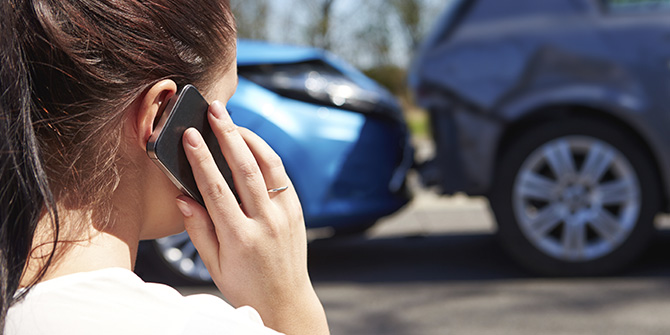
According to the National Highway Traffic Safety Administration, millions of police-reported motor vehicle crashes occur each year, with millions more believed to go unreported. How you react in the event of a car accident may prevent further injuries, reduce costs, and accelerate your cleanup and repair process.
Call emergency services and your insurance company
Stay put after an accident. You don’t want to leave the scene. If possible, move to a safe place to talk and exchange information. Call 911 immediately. When you’re ready to file an insurance claim, you’ll need a police report. While it may be tempting to settle the cost of damages at the scene, doing so may not be in your best financial interest.
You could underestimate the extent of the damage and be stuck with a hefty repair bill. Or the other driver could have a change of heart and report the accident to his or her insurance company after all. The other driver may even claim injuries that weren’t apparent at the scene of the wreck. Your insurance company could end up paying a large settlement, or worse, you could be dragged into a lawsuit. Ensure your insurance company has your version of what happened.
Review your checklist
Having a checklist of what to do after an accident will be a valuable asset. You’ll need:
- Insurance information and contact details of the other driver.
- Contact information for witnesses, if there are any, as well as photos of damage.
- A car accident report from the police.
Your insurance carrier may list the items to check for on the back of your insurance card. Or better yet, plan ahead and download a secure mobile app that detects car crashes and gets you help from trained responders, even if you are unable to respond. Remember, if you’re not using Wi-Fi, data charges may apply. Check with your service provider.
Don’t say too much
While it’s important to share and obtain the necessary information at the scene of the accident, there should be no admission of fault on either side — just an exchange of details. It’s the insurance adjuster’s job to investigate fault among the parties.
Know what your insurance covers
The insurance process will be easier if you’re already familiar with the details of your coverage. Don’t wait until after an accident to find out if your policy doesn’t automatically cover costs for towing or a replacement rental car. Take a few minutes now to review your auto insurance coverage.
Generally, for only a little extra each month, you can add coverage for rental car reimbursement, which can be a cost-saver when your vehicle is in the repair shop. If your vehicle can’t be repaired, it may be time to look for a new auto loan or used car loan.
Knowing what to do after a car accident may save you both time and money. With a little bit of advance preparation, you’ll be ready.
The advice provided is for informational purposes only.
TruStage® Auto Insurance program is offered by TruStage Insurance Agency LLC and issued by leading insurance companies. Discounts are not available in all states and discounts vary by state. The insurance offered is not a deposit and is not federally insured. This coverage is not sold or guaranteed by your Credit Union.
APR = Annual Percentage Rate. New Auto Loan is subject to approval. Rates and credit limit are evaluated based on credit history. A new vehicle is defined as current, prior or upcoming model year with 10,000 miles or less. LGFCU will finance 100% of the MSRP, plus an additional 20% to cover purchase-related expenses such as tax, tags and extended warranties. Cash-out is not permitted on purchase transactions and cash-out refinance transactions are limited to a maximum Loan to Value of 100%. Lending is limited to residents in NC, SC, GA, TN and VA. No pre-payment penalties. Vehicles with branded (flooded, salvaged or reconstructed) titles or motorcycles, boats, RVs and commercial vehicles are not acceptable collateral. Product availability and current rates may be changed at any time at the discretion of the Board of Directors. Borrower must maintain collision and comprehensive insurance protection with a maximum deductible of $1,000 for the life of the loan. Must be age 18 or older to qualify for lending services.
APR = Annual Percentage Rate. Used Auto Loan is subject to approval. Rates and credit limit are evaluated based on credit history. For used vehicles up to 10 years old, mileage may not exceed 150,000 at time of loan origination. LGFCU will finance 100% of the J.D. Power retail value, plus an additional 20% to cover purchaserelated expenses such as tax, tags and extended warranties. Cash-out is not permitted on purchase transactions and cash-out refinance transactions are limited to a maximum Loan to Value of 100%. Lending is limited to residents of NC, SC, GA, TN and VA. No pre-payment penalties. Vehicles with branded (flooded, salvaged or reconstructed) titles or motorcycles, boats, RVs and commercial vehicles are not acceptable collateral. Product availability and current rates may be changed at any time at the discretion of the Board of Directors. Borrower must maintain collision and comprehensive insurance protection with a maximum deductible of $1,000 for the life of the loan. Must be age 18 or older to qualify for lending services.